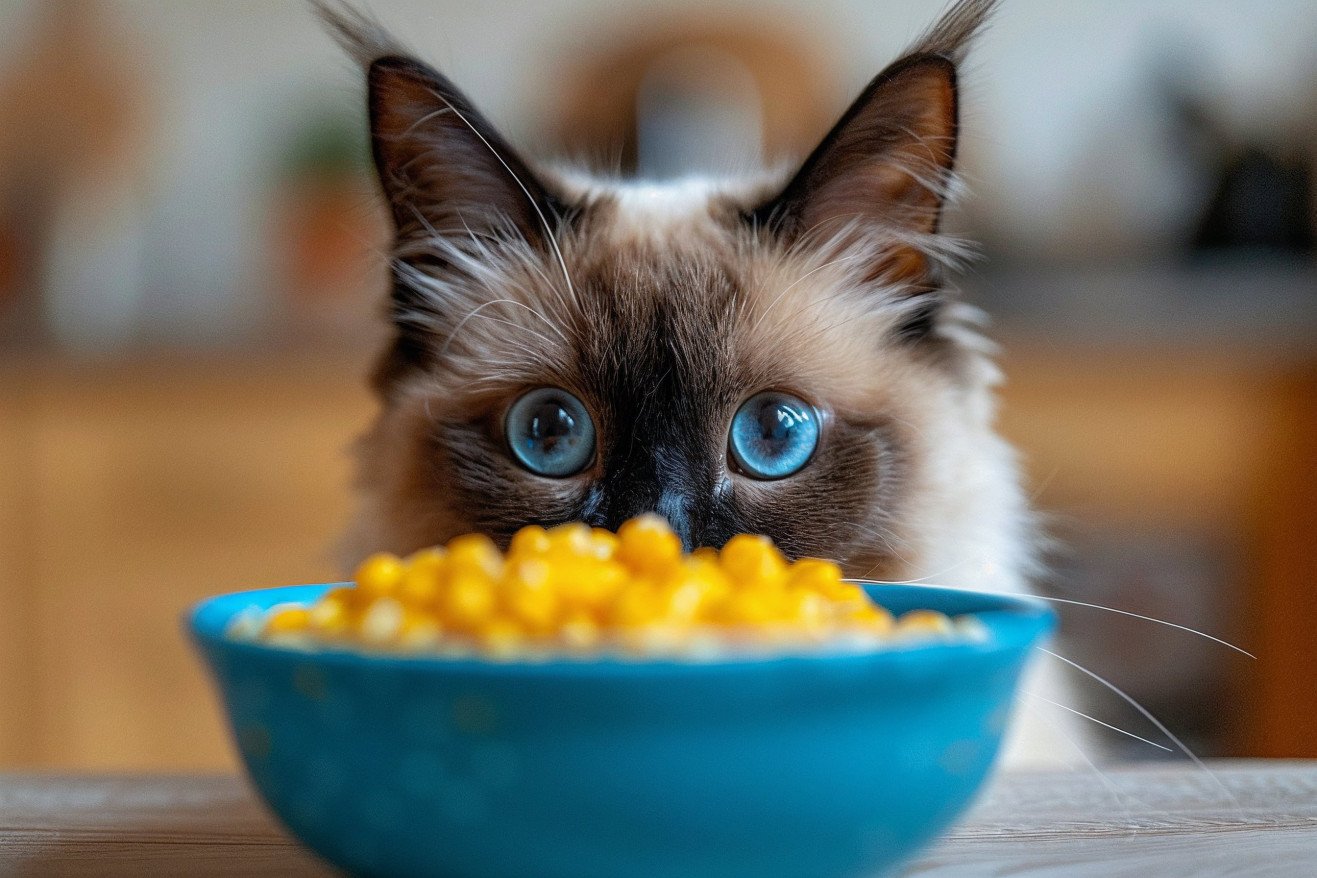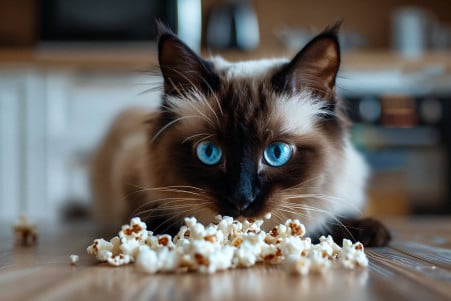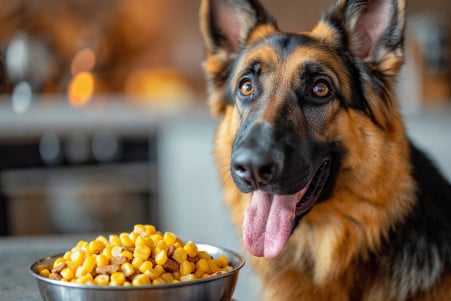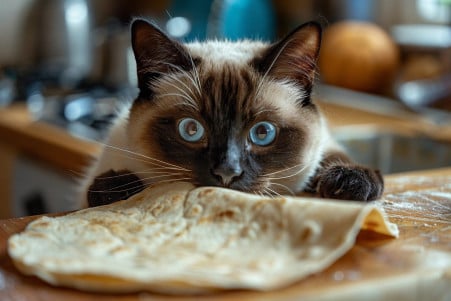Can Cats Eat Corn? A Scientific Look at Corn for Felines
3 April 2024 • Updated 2 April 2024

Can cats eat corn, or is this a food that should be avoided due to potential digestive issues or lack of nutritional value for felines? While cats can eat plain, cooked corn kernels in small amounts as an occasional treat, it has little nutritional value for them. Corn is not toxic but can cause vomiting or diarrhea if fed in excess because cats lack the enzymes to properly digest the cellulose in the kernels.
To make sure we're giving evidence-based information about what cats need in their diet, we'll explore studies by veterinary nutritionists and animal health organizations about corn and its role in feline nutrition. We'll discuss their findings and recommendations about how much corn is safe for cats to eat and how it should be prepared to determine whether an occasional corn kernel is helpful or harmful to a cat's overall health.
Can cats eat corn?
Corn and Cat Digestion: Potential Problems
Cats are obligate carnivores, which means that their bodies are built to digest and derive nutrients from animal-based proteins rather than plant-based ones. This makes it difficult for cats to digest corn, which is high in carbohydrates and fiber. According to PetMD, cats don’t have the enzymes needed to break down and absorb the cellulose in corn kernels.
Eating corn can cause digestive upset in cats. According to The Wildest, this can include vomiting, diarrhea, and general discomfort because the feline digestive system can't process it properly. Even small amounts of plain cooked corn should be fed in moderation because the feline digestive system can't handle too much at once.
In addition to the danger of eating corn kernels, corn husks and cobs can be especially dangerous if ingested by cats. According to research on aflatoxins that The Wildest cites, the rough texture of corn husks and cobs can cause intestinal blockages. Smaller pieces can also be a choking hazard. Corn husks and cobs should be kept away from cats at all times.
Cats that have pre-existing digestive issues or sensitivities may be even more likely to experience negative side effects from eating corn. According to Untamed, senior cats and cats that have gastrointestinal problems should avoid corn because it can be hard for them to digest and because it can exacerbate digestive issues. A cat’s age and health should be taken into account before introducing any new food, including corn.
Corn Allergies and Sensitivities in Cats
Although less common than allergies to animal proteins, some cats are allergic or sensitive to corn. According to VCA Animal Hospitals, vegetable proteins like those found in corn and wheat can be responsible for food allergies in some cats. Symptoms of a corn allergy can include itching, skin inflammation, gastrointestinal problems like vomiting and diarrhea, and respiratory issues.
To diagnose a food allergy, Cornell University College of Veterinary Medicine suggests an 8-12 week elimination diet trial. This involves feeding the cat a "novel" diet that includes protein and carbohydrate sources the cat has never been exposed to, such as venison or potato instead of more common sources like beef or corn. If the allergic signs resolve, the owner can conclude that the allergen is a component of the previous diet.
If a cat is found to be allergic to corn, they should be fed a diet that doesn't include corn or corn-based products, as VCA Animal Hospitals notes that feeding a hypoallergenic diet exclusively for life is highly effective in the treatment of food allergic skin disease in many cats.
Corn in Store-Bought Cat Foods: Health Concerns and Other Options
Since corn is a cheap filler and source of carbohydrates, many store-bought cat foods use it to bulk up their products. According to Pawlicy Advisor, the high levels of carbohydrates and sugars in corn can lead to a variety of health problems in cats, including cardiovascular disease and diabetes. In addition, the Rawz Natural Pet Food article explains that corn, wheat, and soy are common allergens in cats that can cause digestive issues and other allergic reactions.
In addition to these concerns, corn-based cat foods may lead to a variety of health problems in cats. According to Rawz Natural Pet Food, these carbohydrate fillers "do not provide optimal nutrition for cats" and can cause a variety of health problems, including obesity, kidney and liver issues. On the other hand, the Tufts University Cummings School article explains that corn can be a good source of energy and essential nutrients if it's processed properly.
For cats that need to avoid corn, there are plenty of high-quality cat foods to choose from. According to Pawlicy Advisor, pet owners should look for grain-free and limited-ingredient formulas that prioritize animal-based proteins over plant-based fillers like corn. In addition, pet owners can work with their veterinarians to find the best diet for their cat's unique needs and health.
Safe and Healthy Human Treats for Cats
While corn should be kept to a minimum, there are several human foods that can be given to cats as safe, healthy treats. WKBW lists cooked lean meats such as chicken, turkey, and beef as popular, protein-rich options that are also low in calories. Oily fish like mackerel and tuna are also good choices and can even offer omega-3 fatty acids, says PetMD.
Some cooked vegetables can be used as treats as well. The Honest Kitchen recommends broccoli, peas, sweet potatoes, and carrots in small amounts. Fruits like watermelon, strawberries, blueberries, and bananas can also be given to cats as treats as long as they are fed in small amounts and only occasionally, although they are high in sugar. PetMD cautions that fruits should be fed in moderation, especially to cats with health issues like diabetes.
No matter what the treat is, it’s important to keep the portion size small to avoid upsetting the cat’s stomach and never to use the treats as a substitute for the cat’s regular, balanced diet. As The Honest Kitchen notes, human food should be used to supplement a cat’s regular meals, not as a meal replacement. By feeding a range of healthy, safe treats, cat parents can help ensure that their cats are mentally stimulated and happy.
How to Switch Your Cat to a Corn-Free Diet
When you switch your cat to a corn-free diet, it's important to do so gradually over the course of 7-14 days to avoid gastrointestinal distress. According to Preventive Vet, this means starting with a mixture that contains 25% new food and 75% old food and then slowly increasing the ratio of new food to old food over the next 1-2 weeks. This will give your cat's digestive system and palate time to adjust to the new diet.
Throughout the transition, you'll want to keep a close eye on your cat's appetite, litter box behavior, and stool to ensure that they aren't experiencing any gastrointestinal distress, such as vomiting or diarrhea. If you notice any signs of distress, We Are All About Cats recommends extending the transition period and using food toppers or warming wet food to make the new food more appealing to your cat.
If your cat continues to experience gastrointestinal distress or refuses to eat during the transition, Purina suggests reaching out to your veterinarian. They explain that sudden changes in diet can be stressful for cats, and a vet may be able to offer advice or an alternative approach to help you successfully switch your cat to a corn-free diet.
Conclusion: Corn Should Be Used in Cat Diets With Caution
While corn isn't poisonous, cats should be fed corn with caution because of their inability to digest it well. Overconsumption of corn can lead to digestive problems, allergies, and other issues in some cats. Instead, it's best to stick with well-balanced cat foods that have the right protein and fat sources instead of those that are corn-based.
If you want to give your cat a corn treat, a few plain, cooked kernels in moderation should be safe for most cats that don't have any underlying health issues. Talk to your vet to get personalized dietary advice that takes into account your cat's specific health and dietary needs.


